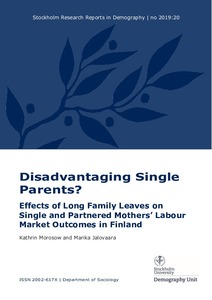Disadvantaging Single Parents? Effects of Long Family Leaves on Single and Partnered Mothers’ Labour Market Outcomes in Finland
Kathrin Morosow; Marika Jalovaara
https://urn.fi/URN:NBN:fi-fe2021042824667
Tiivistelmä
Abstract: One aim of family leaves is to help mothers combine paid work and childcare, yet longer leaves have been shown to weaken women's labour market positions. Moreover, longer leaves can have differential effects across population groups. This study compares the consequences of longer family leaves for single and partnered mothers’ labour market outcomes as measured by unemployment and earnings. We use Finnish register data for 1989 to 2014 to interact mothers’ partnership status with the accumulated family leave length. To consider selection into being a single mother, we compare estimates from OLS and FE models. The results indicate that longer leaves are positively associated with post-leave unemployment in both groups but more strongly among single mothers. Longer leaves are linked to similar lower annual earnings among both single and partnered mothers. We conclude that longer family leaves disproportionately disadvantage single mothers’ employment chances, highlighting the heterogeneity of consequences. These disadvantages are not due to selection into single motherhood, suggesting potential discrimination or work-family reconciliation problems.
Kokoelmat
- Rinnakkaistallenteet [27094]
